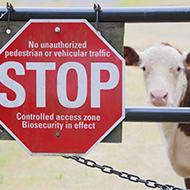
Study highlights the importance of focusing biosecurity efforts.
Researchers in the United States have developed a mathematical model that can predict the risk of cross-species contamination for livestock.
Writing in Veterinary Research, scientists describe how they used the model to reveal that focusing biosecurity efforts on the top three per cent of farms in a particular network could significantly reduce the spread of cross-species disease.
Study author Gustavo Machado, an assistant professor of population health and pathobiology at North Carolina State, explains: “The model shows us a number of interesting points. First, it shows us that we cannot look only at the immediately affected species during an outbreak, as all of the animals are at risk.
“Second, if you target biosecurity efforts toward the top three per cent of the most networked farms you can reduce transmission on those farms and protect other species as well. We hope that this model can help public health officials and farmers target disease counteraction efforts more efficiently and cost-effectively."
The model included three years' worth of data for a population of 90 million animals and traced more than 1.6 million animal movements between farms.
Simulating disease outbreaks that began in cattle, swine, and small ruminants, researchers were able to use the tool to predict the likelihood of cross-species contamination in each case. The team ran 1,000 simulations 100 times to identify all possible outbreak routes.
Nicolas Cardenas, a postdoctoral researcher at NC State, said: "It doesn't matter where the outbreak starts, the entire farm - and the larger farm network in a community - is at risk. We ran simulations with diseases that are transmitted by direct contact, and modelled outbreaks that started on both single-species and multi-host farms to see if there was a difference in outcome, and there wasn't."
He adds, however, that knowing how farms interact with each other and focusing biosecurity and prevention efforts on the most interconnected farms does have an impact.
"The model allowed us to construct a contact network between all of the farms in the study," Cardenas said. "The farms with the greatest numbers of contacts, or hub farms - regardless of how many animals move between them - are the focal points for disease transmission."



 The latest
The latest